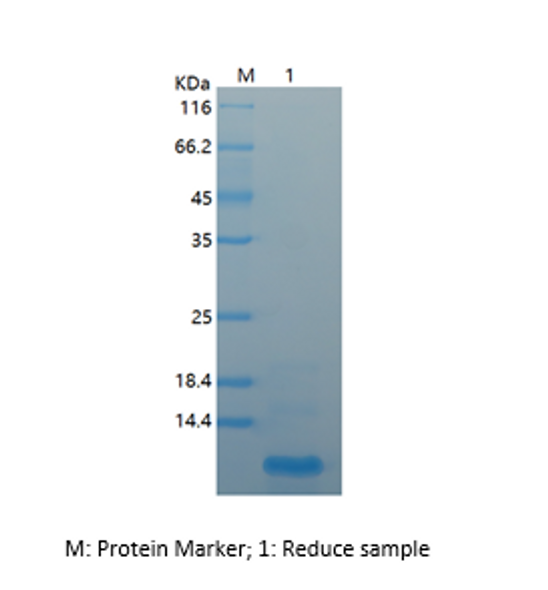Description
Recombinant Human Defensin/Beta-defensin 3/DEFB103 Protein (His Tag) | PKSH031389 | Gentaur US, UK & Europe Disrtribition
Synonyms: BD-3;DEFB-3;DEFB103;DEFB3;hBD-3;HBD3;HBP-3;HBP3
Active Protein: N/A
Activity: A DNA sequence encoding the mature form of human DEFB103A (P81534) (Gly 23-Lys 67) was expressed, with a polyhistidine tag at the N-terminus.
Protein Construction: A DNA sequence encoding the mature form of human DEFB103A (P81534) (Gly 23-Lys 67) was expressed, with a polyhistidine tag at the N-terminus.
Fusion Tag: N-His
Species: Human
Expressed Host: E.coli
Shipping: This product is provided as lyophilized powder which is shipped with ice packs.
Purity: > 99 % as determined by reducing SDS-PAGE.
Endotoxin: Please contact us for more information.
Stability and Storage: Generally, lyophilized proteins are stable for up to 12 months when stored at -20 to -80℃. Reconstituted protein solution can be stored at 4-8℃ for 2-7 days. Aliquots of reconstituted samples are stable at < -20℃ for 3 months.
Molecular Mass: 7.3 kDa
Formulation: Lyophilized from sterile 50mM Tris, 0.3% Ttiton X-100, 0.3% SKL, pH 8.5
Reconstitution: Please refer to the printed manual for detailed information.
Background: Beta-defensin 3 is a member of the defensin family. Defensin family is comprised by microbicidal and cytotoxic peptides made by neutrophils. Members of the beta-defensin 3 family are highly similar in protein sequence. Beta-defensin 3 shows antimicrobial activity against Gram-positive bacteria S.aureus and S.pyogenes, Gram-negative bacteria P.aeruginosa and E.coli and the yeast C.albicans. Beta-defensin 3 is abundantly expressed in skin and tonsils, and to a lesser extent in trachea, uterus, kidney, thymus, adenoid, pharynx and tongue. It is also expressed in salivary gland, bone marrow, colon, stomach, polyp and larynx. However, in small intestine, it cannot be detected. Defensin has broad spectrum antimicrobial activity and may play an important role in innate epithelial defense. Beta-defensin 3 kills multiresistant S.aureus and vancomycin-resistent E.faecium. It has no significant hemolytic activity.
Research Area: Microbiology, immunology








